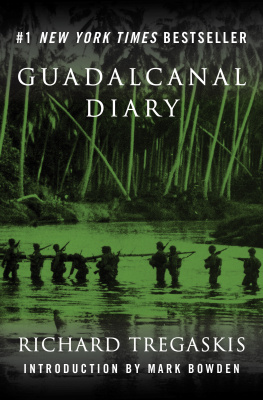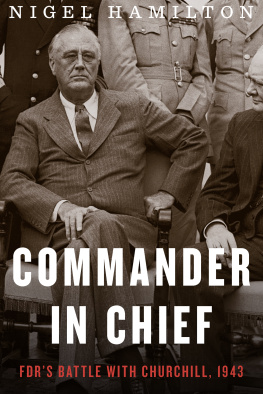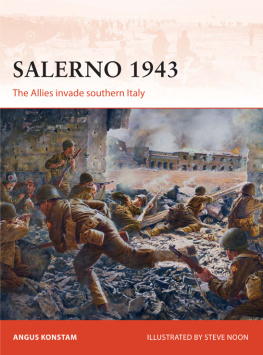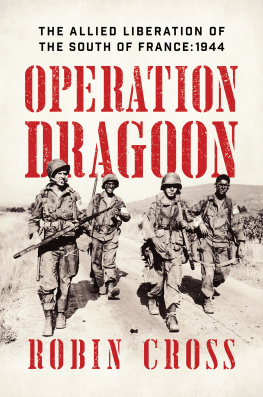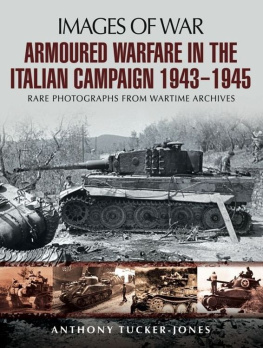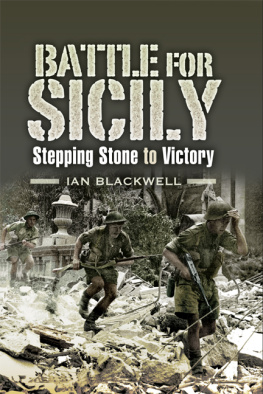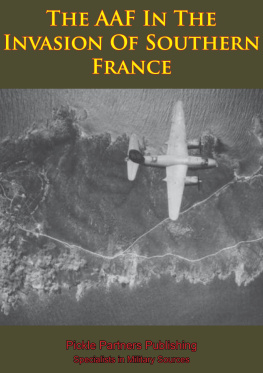Invasion Diary
Richard Tregaskis

In memory
of my beloved sister
MADELINE
Contents
I Waiting
JULY 9, 1943
I had just flown into Algiers from Morocco and was walking down the sun-bathed main street, Rue Michelet, feverishly searching for the Public Relations Office, when I met Pete Huss, the International News Service manager at Allied Headquarters. We shook hands, and then he immediately led me to his room in the Aletti Hotel. He knew, without my saying; that I was hot on the trail of the invasion.
I had been running fast, struggling, cutting corners to get down here to the Mediterranean theater in time for the big excursion into Europe. I followed Pete into his third-floor hotel room, and he shut the door behind us.
Is it Sicily or Sardinia? I asked him. From various indications in London I had guessed that it would be one or the other.
Thats rightSicily, said Huss.
Whens D-day?
Probably tomorrow.
I would have realized as much if I had looked down from the balcony to the blue, white-capped water of the Bay of Algiers. There ten or twelve troop transports, the rails colored khaki by lines of troops, were even then weighing anchor. Some of them had begun to move and I knew that I had missed the landing. It was too late to get aboard this task force.
And theyre only reserves, said Huss. The main force left about a week ago. He grinned at my crestfallen expression. But you can still catch up. Therell be plenty of fighting left to cover.
JULY 10
At 4 A.M. a telephone call summoned us to the Public Relations Office. There was no moon, and it seemed a good night for the invasion. In the press room we found the correspondents assembled for the expected announcement.
The British Col. McCormack, wearing his brilliant red staff officers cap, stepped up to the front of the room, cleared his throat, and said, British, Canadian and American troops began landing operations in Sicily early this morning.
The copythe small amount of it that was permissiblewas passed in, and a deadline of six oclock was declared for the release of the story. It was getting light, and on the balcony outside the press room I saw Hugh Baillie, President of the United Press, looking down into the silent Rue Michelet. Well, he said, I guess plenty of our boys have gone to glory by this time.
JULY 12
This morning I received word that I would be able to get air transportation to Tunis, first step on the way to Sicily.
JULY 13
Gen. Eisenhower arrived from Sicily. We correspondents piled into our jeeps and made a journey of some distance to a villa near Tunis where the generals Headquarters had been set up. It was a spotless modern house with beautiful mosaic floors. A few minutes later, Ike breezed into the room, looking fresh and cheerful. He wore a tropical worsted shirt and trousers, with four silver stars sewn on his collar, his only decoration. He is a good-looking man, with regular features, a balding crown, and notably pale blue eyes. Most striking is his quick, agreeable manner. He seemed to sense the implication of every question quickly, and answered with concise phrases. He said that we are facing 240,000 to 260,000 Italians. They are probably coastal divisions, he said, adding, They have no stomach for fighting.
The campaign has been so far very successful, said the general, and tanks and supplies have been put ashore without any difficulty. More than 500 tanks are in Sicily, 6,000 Italians have been captured, the enemy resistance is negligible, our casualties far lighter than expected. The general said, A decision should be reached in about two weeks, if our present good luck continues. We effected considerable tactical surprise. Evidently the enemy had expected that our attack would be based from Pantelleria, and had prepared for an assault against Northwestern Sicily.
JULY 14
Five days have gone, and still no arrangements for my transfer to Sicily. The swimming at Carthage is wonderful, but, under the circumstances, every pastime is sheer waste. I want to get going.
This afternoon I went to the summer palace of the Bey of Tunis, now an American Army billet, to see Col. Elliott Roosevelt and try to arrange at least a look at Sicily. The photographic reconnaissance group under his command had made twenty-four flights over Sicily yesterday alone. He had flown with the most recent night photo reconnaissance himself in an A-20, and would go over again tonight. I asked him if I could go along and he consented.
Its a wonderful sight, he said. You can see explosions everywhere on the island. You can even pick out the bomb flashes when the bombers are making a raid. The ports are taking an awful beating. Messina looks as if it had been wiped off the map and Palermo is the same way.
I asked the colonel how soon he thought the fight for Sicily would be over. Im not a military expert, he said, but my impression is that it will be over quickly, maybe inside of two weeks. The pressure is on day and night, and the aerial bombardment is terrific. Come along and see for yourself.
JULY 15
I was at La Marsa Airdrome at 1:30 A.M. Outside the Operations Tent, Col. Roosevelt said, Are you all ready? and pointed toward the B-25. It was the same type of two-engined, double-tailed, medium bomber which the Doolittle flyers had taken on the historic attack on Tokyo. Mechanics were working in the half-light, hoisting parachutes and other equipment into the trap-door opening in the belly of the ship.
I put on my Mae West, struggled through the bottom hatch and tried on my parachute. The colonel took the co-pilots seat next to Capt. George Humbrecht of St. Louis. From the small compartment directly behind the pilots and co-pilots chairs, I could look over their shoulders and through the wide strip of windshield.
It was 2:07 A.M. when we took off. We could see the wrinkled mountain mass of North Africa in the growing moonlight. Cape Bon, a rocky point reaching out toward Sicily where the Germans had staged their final evacuation in North Africa, lay to our right. The Mediterranean seemed ghostly still, like a sea of fog in the moonlight. Col. Roosevelts duck-billed cap bobbed as he looked over the water, and the crossed straps of his parachute harness seemed white and distinct. An orange beacon winked on our port beam from the misty plain of the Mediterranean.
Through the astrodome, where the navigator takes his sights, I could see stars strewn over the moonlit sky, and Cassiopoeia, the queen on her chair, pointed toward the North Star. We were heading northeast.
I crawled through the narrow tunnel to the bombardiers compartment in the nose, the greenhouse, where he operates his machine gun and bombsight. It was noticeably cold in the compartment, for we were climbing to the zone of lower temperature. The bombardier, Lieut. Everett Anthony, of Hartford, Conn., was concerned about a light from the toggle switchboard, which seemed to be out of commission.


